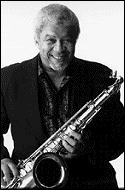 |
Frank FosterTenor Saxophone |
|---|
 |
Frank FosterTenor Saxophone |
|---|
"Frank Foster was a good influence on young Detroiters. He wrote a lot of original music. We kind of equated him with Coltrane at that time."
--Tommy Flanagan
Frank Foster, presented here for the first time as leader of his own recording group, is a product of Cincinnati, Ohio, where he was born in 1928. After playing saxophone and clarinet in high school and at Wilberforce University, he moved to Detroit in 1949 and worked for a while with another great tenor man and Basie alumnus, Wardell Gray. Frank was withdrawn from musical circulation in 1951, when the Army took him for a trip and was not deposited back into the stockpile of civilian star material until May 1953. Shortly after that, he was recommended for a job with Count Basie.
Since the recommendations came from such distinguished people as Ernie Wilkins, alto man and arranger with the Count, and Billy Eckstine, a former bandleader and astute judge of talent, the Count was duly impressed. Frank joined the band in July 1953. Since then he has toured both the United States and Europe. Basie fans who have been led to expect the best from the Count--especially in the tenor sax chair previously occupied by Lester Young, Herschel Evans, Don Byas, et al--were convinced, upon hearing Frank Foster, that the great tradition was being carried on.
--LEONARD FEATHER, from the liner notes,
Here Comes Frank Foster, Bluenote.
His fiery, bop-oriented improvisations and inventive arrangements (including "Down For The Count," "Blues Backstage," and his most famous composition, "Shiny Stockings") were important factors in Basie's success during this period. Foster left Basie in summer 1964 and worked as a freelance in New York before joining Elvin Jones in the late 1960s. He also formed a large ensemble in 1964 (called from the early 1970s the Loud Minority), which he continues to lead occasionally. The band often consists of as many as 25 musicians and plays frequently on an informal basis, and with it Foster has experimented with combinations of spoken drama and jazz.
In 1986 he assumed leadership of Basie's band. He has also continued to perform and record as the leader of small groups, and remains active as a composer. Among his works is Lake Placid Suite, a piece in several movements for jazz orchestra, which was commissioned for the Winter Olympics of 1980.
--SCOTT DeVEAUX, The New Grove Encyclopedia Of Jazz.
A selected discography of Frank Foster albums.
| Find Frank Foster on Amazon.com | Find Frank Foster on eBay.com | |
|---|---|---|
| Frank Foster CDs on Amazon | Frank Foster CDs and LPs on eBay | |
| Frank Foster BOOKs on eBay |
 Music |
 Home |
 Musicians |
|---|
|
Any comments, additions or suggestions should be adressed to:
The Hard Bop Homepage / Eric B. Olsen / ebolsen@juno.com |
Other Web Sites:
The Film Noir 'net A History of Horror The War Film Web Author Eric B. Olsen |